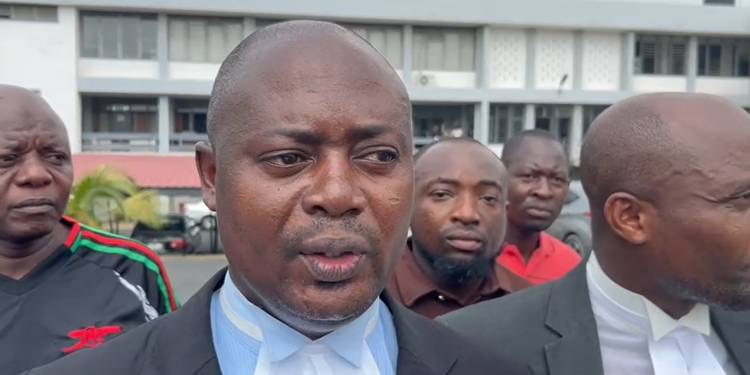The political landscape of Ghana's Akwatia Constituency remains tense as the Koforidua High Court is set to rule on Monday, January 6, 2025, regarding the controversial parliamentary election results for the area. The decision will determine whether Ernest Kumi, the New Patriotic Party (NPP) candidate, can be sworn in as the Member of Parliament for the Akwatia Constituency following a heated legal battle.
The case, presided over by Justice Senyo Amedahe, stems from an earlier injunction filed by Henry Boakye Yiadom, the National Democratic Congress (NDC) candidate, which barred the Electoral Commission (EC), Kumi, and the Clerk of Parliament from proceeding with Kumi's swearing-in.
This legal battle has captured national attention, as it highlights the complexities of electoral disputes and the judicial system's role in ensuring fairness and accountability in Ghana's democratic process.
The Origin of the Dispute
The Akwatia Constituency seat became a flashpoint during the December 7 parliamentary elections, with both NPP and NDC candidates laying claim to victory. Following the EC’s declaration of results at the National Police Training School in Tesano, Accra, Yiadom contested the outcome, alleging irregularities and procedural violations.
On January 2, the High Court issued an interim injunction preventing Kumi’s swearing-in. The court’s decision was based on Yiadom's petition, which argued that the election process had been compromised, warranting judicial intervention to ensure justice.
NPP's Legal Challenge
In response, Ernest Kumi’s legal team, led by Gary Nimako Marfo, filed an application to challenge the injunction. The team argued that the injunction was improperly filed and based on a petition that failed to meet legal standards.
During a special sitting on Sunday, January 5, Marfo urged the court to set aside the injunction and dismiss the petition entirely. He contended that election results could only be legally contested within 21 days of their publication and gazetting, a timeframe he argued the petition did not respect.
Speaking after the proceedings, Marfo emphasized that the legal principles governing election disputes must be upheld to avoid setting a dangerous precedent. However, he refrained from further commentary, citing the pending judgment.
NDC’s Confidence in the Legal Process
On the other side, Mintah Larbi, the NDC's Eastern Regional Director of Legal Affairs, expressed optimism about the court's handling of the case. Describing the injunction as a necessary step to address perceived injustices in the election, Larbi asserted that the NDC had presented a strong case to validate their claims of irregularities.
“We are confident in the court’s ability to deliver justice. This case is not just about Akwatia; it is about preserving the sanctity of our democratic process,†Larbi stated.
Judicial Proceedings and Implications
The Koforidua High Court's decision is expected to have far-reaching implications for both the Akwatia Constituency and Ghana's broader political landscape. If the court upholds the injunction, it could set a precedent for future election disputes, potentially emboldening candidates and parties to challenge results in contentious constituencies.
Conversely, if the court lifts the injunction and clears Kumi for swearing-in, it would reinforce the EC’s authority in declaring results and establish stricter criteria for challenging election outcomes.
Observers note that the case underscores the need for a robust and transparent electoral process. The EC’s handling of disputed constituencies, coupled with the judiciary’s role in adjudicating electoral disputes, will be critical in maintaining public confidence in Ghana’s democratic institutions.
Broader Context of Electoral Disputes
The Akwatia case is one of several legal battles emerging from the December 7 elections, which saw tightly contested races in multiple constituencies. The NPP and NDC have both pursued legal avenues to contest results in constituencies where they believe irregularities occurred.
These disputes highlight the competitive nature of Ghanaian politics and the high stakes involved in parliamentary representation. For voters, these legal battles serve as a reminder of the importance of transparency, accountability, and adherence to the rule of law in preserving the integrity of elections.
The Role of the Judiciary in Electoral Justice
The judiciary’s role in resolving election disputes has come under scrutiny as the public waits for the High Court’s ruling. Legal experts emphasize that the courts must balance competing interests to deliver fair and impartial judgments.
“This case is a litmus test for Ghana’s judiciary. The court’s ruling will not only determine the fate of Akwatia’s representation in Parliament but also influence how future election disputes are approached,†said a political analyst.
A Nation Awaits
As the Koforidua High Court prepares to deliver its judgment, the Akwatia Constituency remains in suspense. For Ernest Kumi, the ruling will determine whether he can take his seat in Parliament and fulfill his campaign promises to his constituents. For Henry Boakye Yiadom, it represents an opportunity to seek redress for what he perceives as electoral injustice.
The case also serves as a reminder of the critical role elections play in shaping governance and the need for all stakeholders to prioritize fairness and transparency. Regardless of the outcome, the ruling is expected to have significant implications for Ghana’s political landscape, setting the tone for future election disputes.
As January 6 approaches, the people of Akwatia and the nation at large await the court’s decision with bated breath, hoping for a resolution that upholds the principles of justice and democracy.




No comments yet
Be the first to share your thoughts!